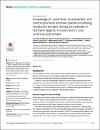Knowledge of Lassa fever, its prevention and control practices and their predictors among healthcare workers during an outbreak in Northern Nigeria: A multi-centre cross-sectional assessment
| Author | Wada, Yusuf Hassan |
| Author | Ogunyinka, Ibrahim Abayomi |
| Author | Yusuff, Kazeem Babatunde |
| Author | Ochu, Chinwe Lucia |
| Author | Yahaya, Mohammed |
| Author | Khalid, Garba Mohammed |
| Author | Mutalub, Yahkub Babatunde |
| Author | Adeniye, Sulaiman Badmus |
| Available date | 2022-04-19T11:04:24Z |
| Publication Date | 2022-03-01 |
| Publication Name | PLoS Neglected Tropical Diseases |
| Identifier | http://dx.doi.org/10.1371/journal.pntd.0010259 |
| Citation | Wada YH, Ogunyinka IA, Yusuff KB, Ochu CL, Yahaya M, Khalid GM, et al. (2022) Knowledge of Lassa fever, its prevention and control practices and their predictors among healthcare workers during an outbreak in Northern Nigeria: A multi-centre cross-sectional assessment. PLoS Negl Trop Dis 16(3): e0010259. https://doi.org/10.1371/journal.pntd.0010259 |
| ISSN | 19352727 |
| Abstract | Background The year 2020 Lassa fever (LF) outbreak had the greatest disease burden and this can place an enormous strain on the already overstretched healthcare system and can potentially increase morbidity and mortality due to infectious diseases. Therefore, having a knowledgeable healthcare workforce with appropriate skills and competencies to prevent and manage outbreaks of a neglected infectious disease such as LF in Nigeria will potentially enhance public health. Thus, this survey assessed the level of knowledge of LF and its prevention and control (PC) measures amongst the healthcare workers (HCWs) during a LF outbreak in Katsina state, Nigeria. Methodology/Principal findings During this cross-sectional survey, HCWs complete a validated 29-item questionnaire com-prising 18 items on the knowledge of LF and its PC measures and an item on global self-evaluation of their LF knowledge. Psychometric properties of the questionnaire were evalu-ated. Chi-square and binary logistic regression analyses were conducted. Out of 435 HCWs invited, a total of 400 participated in the study (92% response rate). The majority of participants (51.8%) demonstrated inadequate LF knowledge, with 62.9% of those scoring low having a high self-perception of their LF knowledge with the global scale. This LF knowledge over-estimation was predicted by LF training status (odds ratio (OR) 2.53; 95% CI: 1.49–4.30; p = 0.001). The level of LF knowledge and its PC measures among the study participants was low (11.60±8.14, 64.4%) and predicted by participants’ LF training status (OR 2.06; 95% CI: 1.19–3.57; p = 0.009), place of work (OR 1.82; 95% CI: 1.07–3.08; p = 0.03) and their designations (OR 2.40; 95% CI: 1.10–5.22; p = 0.03). Conclusion The level of knowledge of LF and its PC measures among the HCWs surveyed was subopti-mal and participants’ LF training status, place of work and occupational category were the significant predictors. In addition, LF knowledge overestimation on a global scale was observed among a majority of HCWs and this was also predicted by LF training status. Therefore, there is a critical need for health authorities in Nigeria to prioritize continuous on-the-job training of HCWs on priority neglected tropical diseases such as Lassa fever. |
| Language | en |
| Publisher | Public Library of Science |
| Subject | Lassa Virus Arenavirus Lymphocytic Choriomeningitis Virus |
| Type | Article |
| Issue Number | 3 |
| Volume Number | 16 |
| ESSN | 1932-6203 |
Files in this item
This item appears in the following Collection(s)
-
Pharmacy Research [1426 items ]


